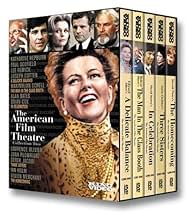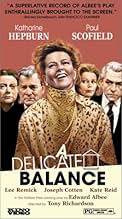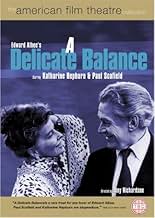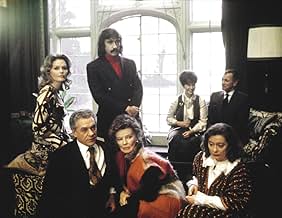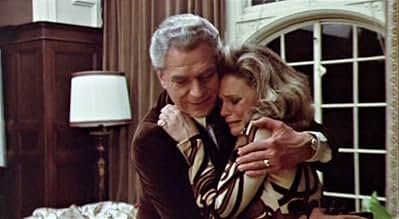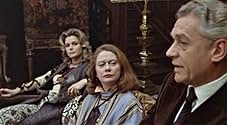AVALIAÇÃO DA IMDb
6,5/10
1 mil
SUA AVALIAÇÃO
Uma família próspera de Connecticut fica abalada quando os padrinhos da filha crescida, tomados por um terror sem nome, decidem morar com eles.Uma família próspera de Connecticut fica abalada quando os padrinhos da filha crescida, tomados por um terror sem nome, decidem morar com eles.Uma família próspera de Connecticut fica abalada quando os padrinhos da filha crescida, tomados por um terror sem nome, decidem morar com eles.
- Direção
- Roteiristas
- Artistas
- Prêmios
- 1 indicação no total
Avaliações em destaque
After seeing this I tried to figure out why it is considered at all above the ordinary. The characters are: a domineering wife, a docile husband, an alcoholic sister, a daughter working on her fourth divorce, friends in a crisis of anxiety. I suppose this exaggerated mix is interesting to a playwright, but maybe not to an audience, at least to this member of the audience. My interest flagged while spending over two hours watching these unhappy people work through their long-standing problems.
Katharine Hepburn as Agnes, the wife, is, well, Katharine Hepburn. That is good as far as it goes, but her performance here seemed overly rehearsed--every body movement and spoken line struck me as anything but spontaneous. If I had not known that it was Paul Schofield as Tobias, the husband, I would not have found his performance all that remarkable. Kate Reid's performance as Claire, Agnes' alcoholic sister, might play well on stage, but here it struck me as embarrassingly overacted, perhaps exaggerated by the extreme close-ups and silly script elements like the accordion playing. Lee Remick did add some spark as Julia, the much-divorced daughter. Betsy Blair, as Edna, a supposed friend, gave little indication why Agnes and Tobias should find her of value (not sure if this was a result of her performance or the script). Joseph Cotton, as Harry, Edna's husband, turned in the most sincere performance, making me think that he has been under-appreciated as an actor.
I liked the question raised of when love for friends equals, or even trumps, inherent family bonds. This play gives credence to Robert Frost's quote, "Home is the place, when you have to go there, they have to take you in," and submits that this quote is not as nearly a given when applied to friends.
I found some character behaviors unfathomable. Consider Julia's reaction to Harry and Edna's taking over her bedroom. She was insulted by this from the beginning, but about midway through the play she went ballistic and finally flew upstairs in a rage. Later Harry reported that Julia had become hysterical and was blocking a doorway with her arms outstretched. I fully expected that in subsequent scenes Julia would be carted off to the nut house, but no, the next morning she was calm and collected. When Harry and Edna came in to the house uninvited, with the intention of moving in, they appeared to be disconnected from reality. But then overnight they became rational.
Spending time with these people would be something that I would not look forward too, but neither did I want to spend two hours with them in this movie, being confined to a house with nothing to entertain but conversation. On the other hand, I would not want to spend time with George and Martha of, "Who's Afraid of Virginia Woolf" either, but I found that movie spellbinding.
Rather than the filming of a stage play, this movie is an adaptation. No matter how director Richardson tries to break up the monotony by mixing close-ups and two shots and using different vantage points for the camera, he cannot overcome the essential staginess, particularly given Albee's stricture that his text was not to be changed. I think that the filming of a stage production of this might have been preferable, since there is no pretense there of a realistic setting. It was a delicate balance for the family in this play to stay together but the movie fails to achieve the delicate balance of turning a stage play into an engrossing movie.
I think only those who appreciate stage productions will truly appreciate this movie.
Katharine Hepburn as Agnes, the wife, is, well, Katharine Hepburn. That is good as far as it goes, but her performance here seemed overly rehearsed--every body movement and spoken line struck me as anything but spontaneous. If I had not known that it was Paul Schofield as Tobias, the husband, I would not have found his performance all that remarkable. Kate Reid's performance as Claire, Agnes' alcoholic sister, might play well on stage, but here it struck me as embarrassingly overacted, perhaps exaggerated by the extreme close-ups and silly script elements like the accordion playing. Lee Remick did add some spark as Julia, the much-divorced daughter. Betsy Blair, as Edna, a supposed friend, gave little indication why Agnes and Tobias should find her of value (not sure if this was a result of her performance or the script). Joseph Cotton, as Harry, Edna's husband, turned in the most sincere performance, making me think that he has been under-appreciated as an actor.
I liked the question raised of when love for friends equals, or even trumps, inherent family bonds. This play gives credence to Robert Frost's quote, "Home is the place, when you have to go there, they have to take you in," and submits that this quote is not as nearly a given when applied to friends.
I found some character behaviors unfathomable. Consider Julia's reaction to Harry and Edna's taking over her bedroom. She was insulted by this from the beginning, but about midway through the play she went ballistic and finally flew upstairs in a rage. Later Harry reported that Julia had become hysterical and was blocking a doorway with her arms outstretched. I fully expected that in subsequent scenes Julia would be carted off to the nut house, but no, the next morning she was calm and collected. When Harry and Edna came in to the house uninvited, with the intention of moving in, they appeared to be disconnected from reality. But then overnight they became rational.
Spending time with these people would be something that I would not look forward too, but neither did I want to spend two hours with them in this movie, being confined to a house with nothing to entertain but conversation. On the other hand, I would not want to spend time with George and Martha of, "Who's Afraid of Virginia Woolf" either, but I found that movie spellbinding.
Rather than the filming of a stage play, this movie is an adaptation. No matter how director Richardson tries to break up the monotony by mixing close-ups and two shots and using different vantage points for the camera, he cannot overcome the essential staginess, particularly given Albee's stricture that his text was not to be changed. I think that the filming of a stage production of this might have been preferable, since there is no pretense there of a realistic setting. It was a delicate balance for the family in this play to stay together but the movie fails to achieve the delicate balance of turning a stage play into an engrossing movie.
I think only those who appreciate stage productions will truly appreciate this movie.
In Connecticut, Agnes and Tobias (Katharine Hepburn and Paul Scofield) are an upper-class married couple whose relationship has been uneasy for many years, since at least the time their son died; but they've managed to find a certain comfortable pattern of uneasiness. Agnes's sister, Claire (Kate Reid), lives with them and insists that her perpetual drinking is not alcoholism but willfulness. Their daughter, Julia (Lee Remick), poised to have her fourth divorce, has come back home. Unexpectedly, her room has been taken over by Harry and Edna (Joseph Cotten and Betsy Blair), best friends of Tobias and Agnes. Seized by a nameless terror that propelled them out of their own house, Harry and Edna have decided to stay.
The slightly elliptical nature of this material is more annoying than fascinating, but there's still plenty of interest and plenty of opportunity for a team of terrific actors to do their thing. Yet another great Katharine Hepburn performance preserved on film is yet another reason for us to be grateful, but Paul Scofield and Kate Reid have left fewer of their performances for posterity; and so it's nice we have this film, which gives each a fully realized character to play.
"A Delicate Balance" is a play by Edward Albee, produced by the American Film Theatre with no alterations and no foolish attempts to open it up. Alfred Hitchcock proved several times that a limited space can be an asset to a movie; and while the film making here is not at his level, Tony Richardson does a nice job at directing our eye and staying out of the play's way.
The slightly elliptical nature of this material is more annoying than fascinating, but there's still plenty of interest and plenty of opportunity for a team of terrific actors to do their thing. Yet another great Katharine Hepburn performance preserved on film is yet another reason for us to be grateful, but Paul Scofield and Kate Reid have left fewer of their performances for posterity; and so it's nice we have this film, which gives each a fully realized character to play.
"A Delicate Balance" is a play by Edward Albee, produced by the American Film Theatre with no alterations and no foolish attempts to open it up. Alfred Hitchcock proved several times that a limited space can be an asset to a movie; and while the film making here is not at his level, Tony Richardson does a nice job at directing our eye and staying out of the play's way.
Time has not been kind to the movies made under the umbrella of the well intentioned American Film Theater. The bulk of these works are way off the mark, failing to achieve one of the major goals of the project; the preservation of these important plays on screen. "Butley", "The Homecoming" and "A Delicate Balance" are the ones that came off best.
"A Delicate Balance" Albee in his prime; relentlessly razor sharp. Director Tony Richardson thankfully makes little effort to diminish the inherent staginess and theatricality. He allows his superb cast to milk Albee's barbs to their last drop.
Katherine Hepburn turns in a terrific performance, though those who have a distaste for the Hepburn mannerisms, will not be converted. It's a pleasure to watch both Kate Reid and Paul Scofield, consummate stage performers who fared far less well in the cinema.
While overlong and at times uneven, "A Delicate Balance" is strictly for theater lovers. They will not be disappointed.
"A Delicate Balance" Albee in his prime; relentlessly razor sharp. Director Tony Richardson thankfully makes little effort to diminish the inherent staginess and theatricality. He allows his superb cast to milk Albee's barbs to their last drop.
Katherine Hepburn turns in a terrific performance, though those who have a distaste for the Hepburn mannerisms, will not be converted. It's a pleasure to watch both Kate Reid and Paul Scofield, consummate stage performers who fared far less well in the cinema.
While overlong and at times uneven, "A Delicate Balance" is strictly for theater lovers. They will not be disappointed.
Director Tony Richardson's presentation of "A Delicate Balance" could be dismissed for it's lack of edginess and it's gentrified (albeit screwed up) characters. It is also what critics would call a "stagy" film. Yet it is redeemed from this dour damnation because of Albee's wonderful way with words, the rich cinematography, and exceptional acting, exceptionally well cast: Katherine Hepburn, Paul Scofield, Lee Remick, Joseph Cotton.
For those looking for a violent film -- not in the form of bullets or explosions -- but of verbal surgical strikes, this is it. Edward Albee's dialogue provides all the female (yes, this would be considered a "woman's movie") protagonists and antagonists (one wonders at times which is which) a laser like aim against their primary targets: other women. And it is done under a guise of "civility"; sometimes, with a smile.
The stand-out among these veteran actors is Kate Reid, who plays Claire, the alcoholic in-law who at times gives the most voice to the story, set amid a dysfunctional Connecticut family. But even her performance can't out weigh the constant barrage of verbal cross-fire from her friends and in-laws. Yet the twist here is that the aggressors are the women, while the men attempt to keep the peace as best they can -- only firing back if attacked by the females.
This isn't a film for everyone; it's definitely the stuff of classic drawing room (psycho) drama. But for those who can appreciate consummate acting armed with deft dialogue, make yourself a nice cup of tea -- spiked with a shot or two of brandy -- and check this out.
For those looking for a violent film -- not in the form of bullets or explosions -- but of verbal surgical strikes, this is it. Edward Albee's dialogue provides all the female (yes, this would be considered a "woman's movie") protagonists and antagonists (one wonders at times which is which) a laser like aim against their primary targets: other women. And it is done under a guise of "civility"; sometimes, with a smile.
The stand-out among these veteran actors is Kate Reid, who plays Claire, the alcoholic in-law who at times gives the most voice to the story, set amid a dysfunctional Connecticut family. But even her performance can't out weigh the constant barrage of verbal cross-fire from her friends and in-laws. Yet the twist here is that the aggressors are the women, while the men attempt to keep the peace as best they can -- only firing back if attacked by the females.
This isn't a film for everyone; it's definitely the stuff of classic drawing room (psycho) drama. But for those who can appreciate consummate acting armed with deft dialogue, make yourself a nice cup of tea -- spiked with a shot or two of brandy -- and check this out.
Scenes from the life of an argumentative middle-class family: a strong-willed wife and a resigning husband are confronted with her alcoholic sister, their continuously marrying daughter, and their friend couple who are afraid of being alone.
Completely uncinematic, downbeat and very static photographed play, from a Pulitzer prize-winning Albee material, with all the psychological soul-killings expected from the author. A pretty valuable record of a theatrical performance: brilliant dialogue and acting are the best it can offer - and it does so.
Completely uncinematic, downbeat and very static photographed play, from a Pulitzer prize-winning Albee material, with all the psychological soul-killings expected from the author. A pretty valuable record of a theatrical performance: brilliant dialogue and acting are the best it can offer - and it does so.
Você sabia?
- CuriosidadesThis was the first (and only) time that Joseph Cotten and Katharine Hepburn appeared together since they starred in the original Broadway production of "The Philadelphia Story" in 1939.
- Citações
Agnes: Time! Time happens, I suppose, to people. Everything becomes... too late, finally. You know it's going on up on the hill; you can see the dust, and hear the cries, and the steel... but you wait, and time happens. When you do go, sword, shield... finally... there's nothing there... save rust, bones and the wind.
Principais escolhas
Faça login para avaliar e ver a lista de recomendações personalizadas
- How long is A Delicate Balance?Fornecido pela Alexa
Detalhes
- Data de lançamento
- Países de origem
- Idioma
- Também conhecido como
- Un equilibrio delicado
- Locações de filme
- Empresas de produção
- Consulte mais créditos da empresa na IMDbPro
- Tempo de duração
- 2 h 13 min(133 min)
- Mixagem de som
- Proporção
- 1.78 : 1
Contribua para esta página
Sugerir uma alteração ou adicionar conteúdo ausente


